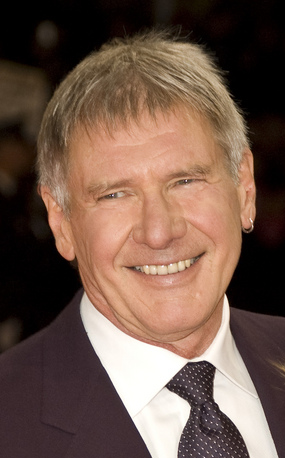Last Updated on April 6, 2025 by Bertrand Clarke
Harrison Ford. The name conjures images of rugged heroes, daring escapes, and a quiet, understated charisma that has captivated audiences for decades. He is Indiana Jones, Han Solo, Jack Ryan – characters etched into the collective consciousness of generations. But behind the Hollywood legend lies a story of perseverance, self-discovery, and an unwavering belief in his own potential, even when faced with rejection and self-doubt. This is the story of how a struggling young man, more comfortable with the scent of sawdust than the glare of spotlights, carved his own path to become one of the most iconic figures in cinematic history.
A Midwestern Upbringing: Finding His Place
Born on July 13, 1942, in Chicago, Illinois, Harrison Ford’s early life offered little indication of the stardom that awaited him. His father, Christopher Ford, was an advertising executive, and his mother, Dorothy, a former radio actress. The family background was a blend of Irish Catholic and Ashkenazi Jewish heritage, a diverse tapestry that perhaps contributed to Ford’s open-mindedness and ability to connect with people from all walks of life.
Ford himself has described his childhood as relatively unremarkable. He was a self-confessed “late bloomer,” struggling academically and socially. He attended Maine East High School in Park Ridge, Illinois, where he was active in the Boy Scouts, achieving the rank of Life Scout. However, he wasn’t a standout student and battled shyness and a lack of direction. He often felt out of place, unsure of his talents and what he wanted to pursue. This early struggle with confidence would become a recurring theme in his life, fueling his determination to prove himself.
After high school, Ford attended Ripon College in Wisconsin, majoring in philosophy and English. He was drawn to the intellectual stimulation of the liberal arts, but still lacked a clear career path. It was during his senior year that he stumbled into acting, almost by accident. To overcome his crippling shyness, he enrolled in a drama class. He found the experience surprisingly liberating, a chance to express himself and connect with others in a way he hadn’t experienced before.
Hollywood’s Doors Remain Shut: A Carpenter’s Calling
Upon graduating from Ripon, Ford and his first wife, Mary Marquardt, moved to Los Angeles in 1964. He signed a contract with Columbia Pictures for $150 a week, hoping to find his footing in the film industry. He landed a series of uncredited roles in films and television shows, often playing bellhops or minor characters. The work was unfulfilling, and the pay barely covered the bills. He was often told he lacked the “star quality” needed to succeed in Hollywood.
Frustrated and disillusioned, Ford chose to leave his contract after Columbia didn’t renew it and later dropped by Universal due to feeling typecast. Discouraged by the lack of opportunities and the constant rejection, Ford turned to carpentry to support his family. He taught himself the trade, finding a sense of satisfaction in creating something tangible with his own hands. He initially took on small jobs, building decks and remodeling homes. His skills grew, and he soon gained a reputation for his craftsmanship and attention to detail.
Carpentry became more than just a means to an end; it was a creative outlet, a way to exercise his problem-solving skills, and a source of pride. He enjoyed the physical labor and the satisfaction of transforming raw materials into functional and beautiful objects. He even started his own company, “Harrison Ford: Professional Carpenter,” building custom furniture and cabinets for clients in the Los Angeles area.
A Chance Encounter: Rekindling the Dream
While Ford found success in carpentry, he never truly abandoned his acting aspirations. He occasionally took on small roles in television shows to keep his hand in the game. In the early 1970s, a chance encounter with a rising young director named George Lucas would change the course of his life forever.
Lucas hired Ford to build cabinets for his office and, impressed by his work ethic and personality, later cast him in his coming-of-age film, American Graffiti (1973). Although the role was relatively small, it marked a turning point for Ford. He felt a renewed sense of purpose and realized that his passion for acting was still very much alive.
Star Wars: A Galaxy Far, Far Away and a Star is Born
Lucas recognized Ford’s potential and remembered him when casting his next project: Star Wars. Despite the studio’s initial reluctance, Lucas insisted on casting Ford as the roguish smuggler Han Solo. The rest, as they say, is history.
Star Wars (1977) became a global phenomenon, catapulting Ford to international stardom. His portrayal of Han Solo, a cynical yet charismatic anti-hero, resonated with audiences of all ages. He brought a unique blend of humor, swagger, and vulnerability to the role, making Han Solo one of the most beloved characters in cinematic history.
The success of Star Wars opened doors for Ford that had previously been firmly shut. He quickly became one of the most sought-after actors in Hollywood, starring in a string of critically acclaimed and commercially successful films.
Indiana Jones: The Archetypal Adventurer
In 1981, Ford reunited with Lucas and director Steven Spielberg for Raiders of the Lost Ark, the first installment in the Indiana Jones franchise. As the adventurous archaeologist Indiana Jones, Ford cemented his status as a true movie icon. He embodied the character’s intelligence, wit, and physicality, creating a hero that was both relatable and aspirational.
The Indiana Jones films were a massive success, further solidifying Ford’s position as a box office draw. His performances in the sequels, Indiana Jones and the Temple of Doom (1984) and Indiana Jones and the Last Crusade (1989), continued to thrill audiences and cemented Indiana Jones as one of the most iconic characters in film history.
Beyond the Blockbusters: A Diverse Career
While best known for his action roles, Ford has also demonstrated his versatility as an actor in a wide range of genres. He starred in thrillers like Blade Runner (1982) and Witness (1985), showcasing his ability to portray complex and nuanced characters. He also showed his comedic talent in films like Working Girl (1988) and Sabrina (1995).
Ford’s commitment to his craft and his willingness to take on challenging roles have earned him critical acclaim and numerous awards throughout his career. He has received a star on the Hollywood Walk of Fame, a Lifetime Achievement Award from the American Film Institute, and a Cecil B. DeMille Award from the Hollywood Foreign Press Association.
Personal Life and Activism: Beyond the Silver Screen
Ford’s personal life has been as eventful as his professional life. He has been married three times and has five children. His first marriage to Mary Marquardt ended in divorce in 1979. He later married screenwriter Melissa Mathison in 1983, and they divorced in 2004. In 2010, he married actress Calista Flockhart.
Outside of acting, Ford is a passionate environmental activist and a licensed pilot. He is a vocal advocate for conservation and has dedicated much of his time and resources to protecting endangered species and preserving natural habitats. He has also served as vice chairman of Conservation International and has worked with numerous other environmental organizations.
A Legacy of Inspiration: From Rejection to Icon
Harrison Ford’s story is a testament to the power of perseverance, self-belief, and the importance of following your passions, even when faced with adversity. He is a reminder that success is not always linear and that detours and setbacks can often lead to unexpected opportunities.
From his early struggles with shyness and self-doubt to his rejection by Hollywood studios, Ford’s journey has been marked by challenges. But through it all, he remained determined to prove himself and to pursue his dreams. His story is an inspiration to anyone who has ever felt lost, uncertain, or discouraged. He shows us that with hard work, dedication, and a willingness to take risks, anything is possible.
Harrison Ford is more than just a movie star; he is a cultural icon, a symbol of resilience, and a true American success story. His legacy will continue to inspire generations of actors and dreamers for years to come. His journey from a carpenter’s bench to the heights of Hollywood is a powerful reminder that even the most unlikely individuals can achieve greatness with passion, perseverance, and an unwavering belief in their own potential.










